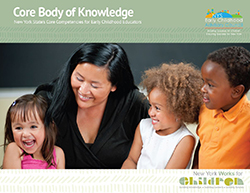Core Body of Knowledge
NY's Core Competencies for Early Childhood Educators
Navigation
Competency Description
The professional working with young children practices responsible assessment
Behaviors & Skills
a
Assesses children using tools they are fully qualified and trained to use, especially in the case of formal assessment
b
Reviews and considers information the family has provided about their child, as well as information provided by other programs or teachers, before beginning an assessment
c
Encourages families to share the concerns, hopes and developmental goals they have for their child
d
Ensures that assessment procedures are culturally and linguistically appropriate
e
Ensures that multiple measures are used to assess children (i.e., observations, curriculum-based assessments, work samples, clinical opinion, etc.)
f
Accommodates children's physical, temperamental, and sensory differences when choosing assessment materials and procedures
g
When possible, assesses children during familiar routines, with familiar materials, people and contexts, rather than only in controlled situations
h
Makes sure children are familiar with the assessor(s)
i
Considers children's strengths and needs across all developmental domains when giving an assessment and interpreting results
j
Uses assessment tools that are relevant to curriculum or program planning
k
Informs families about state Early Intervention/Early Childhood Special Education rules and regulations regarding assessment
Resources for Competency 3.2
1
Print

